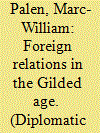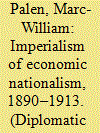| Srl | Item |
| 1 |
ID:
123836


|
|
|
|
|
| Publication |
2013.
|
| Summary/Abstract |
This article examines the influence of Victorian free-trade ideology upon American foreign relations. Victorian free-trade ideology-also known as Cobdenism-gained ground among a small but powerful group of predominantly New England intellectuals. These American Cobdenites became members of the Cobden Club of England, a club that sought to spread free trade throughout the world and was thus seen as a threat to American protectionism. Many of these American Cobdenite members also exerted previously unrecognized influence at both the governmental and nongovernmental level upon Republican and Democratic politics. Cobdenism is nearly absent from American foreign relations historiography. Yet Anglophobic economic nationalists at the time viewed such influence as a transatlantic free-trade conspiracy. By investigating this controversy, I argue that Cobdenism greatly affected Gilded-Age foreign and domestic policies, particularly regarding American attempts at instituting freer trade, maintaining the gold standard, informal imperialism, and developing more amicable Anglo-American relations.
|
|
|
|
|
|
|
|
|
|
|
|
|
|
|
|
| 2 |
ID:
138315


|
|
|
|
|
| Summary/Abstract |
Debunking the common laissez-faire myth surrounding turn-of-the-century American foreign relations allows for a reconceptualization of American imperialism from 1890 to 1913. The Republican Party, the party of protectionism, found itself riven by internal disagreements over the future of the protectionist system and U.S. imperial expansion. From within Republican protectionist ranks arose a progressive wing that increasingly looked beyond the home market for the country’s growing American agricultural and manufacturing surpluses. They did so against staunch anti-imperial opposition not only from American free-trade independents, but also from the Republican Party’s isolationist home-market protectionists, who yet feared or disdained foreign markets and colonial acquisitions. These progressive Republican proponents of empire combined coercive trade reciprocity with protectionism—an expansive closed door—and worked hard to extend American imperial power through informal means of high tariff walls, closed U.S.-controlled markets, and retaliatory reciprocity if possible, by formal annexation and military interventionism when necessary. The American Empire thus arose owing to the imperialism of economic nationalism, not the imperialism of free trade.
|
|
|
|
|
|
|
|
|
|
|
|
|
|
|
|
| 3 |
ID:
180336


|
|
|
|
|
| Summary/Abstract |
The regional and global integration projects of the 1990s had social scientists’ imaginations running wild. The “new world order” was their oyster. The Cold War fizzled out in the early 1990s. The European Union was founded in 1993. The North American Free Trade Agreement (NAFTA) came into force in 1994. The World Trade Organization (WTO) kicked off in 1995. Capitalist integration and international cooperation had seemingly replaced the Manichean divisiveness of the previous decades. “Instead of containment or détente,” the German philosopher Thomas Pogge observed in 1992, “political scientists are discussing grand pictures: the end of history, or the inevitable proliferation and mutual pacifism of democracies.”1 The erosion of the nation-state was at hand; national sovereignty would be subordinated to supranational governance, and national community transformed into global citizenship.2 By the turn of the millennium, globalism appeared triumphant.
|
|
|
|
|
|
|
|
|
|
|
|
|
|
|
|